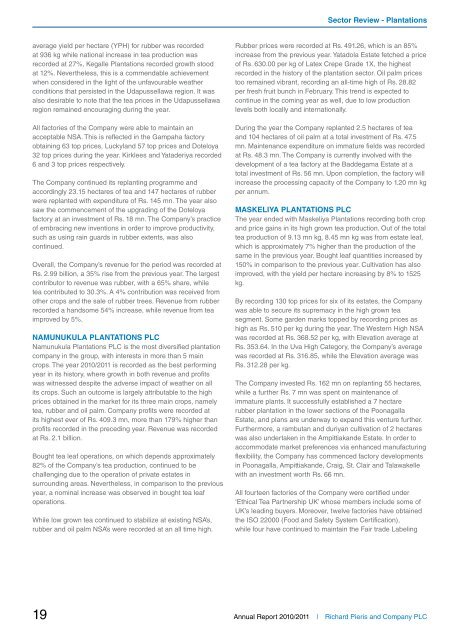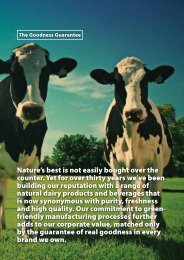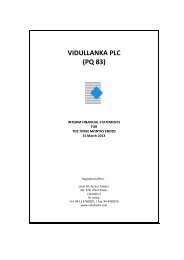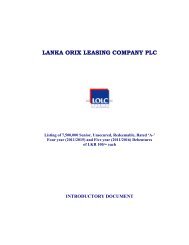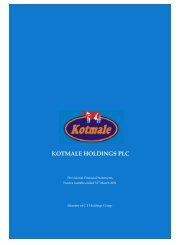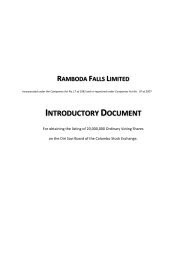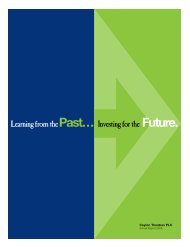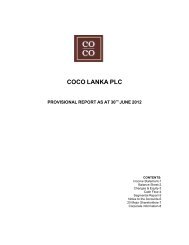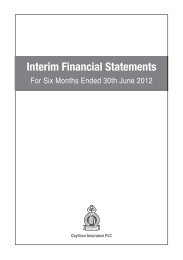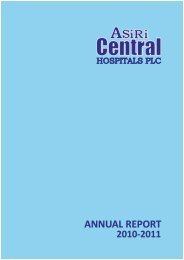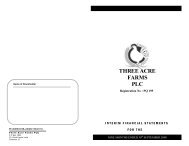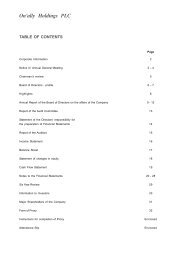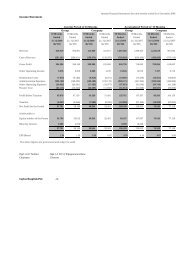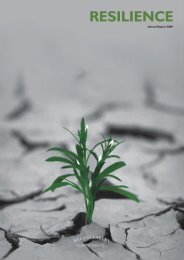Annual Report 2010-2011 - Colombo Stock Exchange
Annual Report 2010-2011 - Colombo Stock Exchange
Annual Report 2010-2011 - Colombo Stock Exchange
You also want an ePaper? Increase the reach of your titles
YUMPU automatically turns print PDFs into web optimized ePapers that Google loves.
Sector Review - Plantations<br />
average yield per hectare (YPH) for rubber was recorded<br />
at 936 kg while national increase in tea production was<br />
recorded at 27%, Kegalle Plantations recorded growth stood<br />
at 12%. Nevertheless, this is a commendable achievement<br />
when considered in the light of the unfavourable weather<br />
conditions that persisted in the Udapussellawa region. It was<br />
also desirable to note that the tea prices in the Udapussellawa<br />
region remained encouraging during the year.<br />
All factories of the Company were able to maintain an<br />
acceptable NSA. This is reflected in the Gampaha factory<br />
obtaining 63 top prices, Luckyland 57 top prices and Doteloya<br />
32 top prices during the year. Kirklees and Yataderiya recorded<br />
6 and 3 top prices respectively.<br />
The Company continued its replanting programme and<br />
accordingly 23.15 hectares of tea and 147 hectares of rubber<br />
were replanted with expenditure of Rs. 145 mn. The year also<br />
saw the commencement of the upgrading of the Doteloya<br />
factory at an investment of Rs. 18 mn. The Company’s practice<br />
of embracing new inventions in order to improve productivity,<br />
such as using rain guards in rubber extents, was also<br />
continued.<br />
Overall, the Company’s revenue for the period was recorded at<br />
Rs. 2.99 billion, a 35% rise from the previous year. The largest<br />
contributor to revenue was rubber, with a 65% share, while<br />
tea contributed to 30.3%. A 4% contribution was received from<br />
other crops and the sale of rubber trees. Revenue from rubber<br />
recorded a handsome 54% increase, while revenue from tea<br />
improved by 5%.<br />
NAMUNUKULA PLANTATIONS PLC<br />
Namunukula Plantations PLC is the most diversified plantation<br />
company in the group, with interests in more than 5 main<br />
crops. The year <strong>2010</strong>/<strong>2011</strong> is recorded as the best performing<br />
year in its history, where growth in both revenue and profits<br />
was witnessed despite the adverse impact of weather on all<br />
its crops. Such an outcome is largely attributable to the high<br />
prices obtained in the market for its three main crops, namely<br />
tea, rubber and oil palm. Company profits were recorded at<br />
its highest ever of Rs. 409.3 mn, more than 179% higher than<br />
profits recorded in the preceding year. Revenue was recorded<br />
at Rs. 2.1 billion.<br />
Bought tea leaf operations, on which depends approximately<br />
82% of the Company’s tea production, continued to be<br />
challenging due to the operation of private estates in<br />
surrounding areas. Nevertheless, in comparison to the previous<br />
year, a nominal increase was observed in bought tea leaf<br />
operations.<br />
While low grown tea continued to stabilize at existing NSA’s,<br />
rubber and oil palm NSA’s were recorded at an all time high.<br />
Rubber prices were recorded at Rs. 491.26, which is an 85%<br />
increase from the previous year. Yatadola Estate fetched a price<br />
of Rs. 630.00 per kg of Latex Crepe Grade 1X, the highest<br />
recorded in the history of the plantation sector. Oil palm prices<br />
too remained vibrant, recording an all-time high of Rs. 28.82<br />
per fresh fruit bunch in February. This trend is expected to<br />
continue in the coming year as well, due to low production<br />
levels both locally and internationally.<br />
During the year the Company replanted 2.5 hectares of tea<br />
and 104 hectares of oil palm at a total investment of Rs. 47.5<br />
mn. Maintenance expenditure on immature fields was recorded<br />
at Rs. 48.3 mn. The Company is currently involved with the<br />
development of a tea factory at the Baddegama Estate at a<br />
total investment of Rs. 56 mn. Upon completion, the factory will<br />
increase the processing capacity of the Company to 1.20 mn kg<br />
per annum.<br />
MASKELIYA PLANTATIONS PLC<br />
The year ended with Maskeliya Plantations recording both crop<br />
and price gains in its high grown tea production. Out of the total<br />
tea production of 9.13 mn kg, 8.45 mn kg was from estate leaf,<br />
which is approximately 7% higher than the production of the<br />
same in the previous year. Bought leaf quantities increased by<br />
150% in comparison to the previous year. Cultivation has also<br />
improved, with the yield per hectare increasing by 8% to 1525<br />
kg.<br />
By recording 130 top prices for six of its estates, the Company<br />
was able to secure its supremacy in the high grown tea<br />
segment. Some garden marks topped by recording prices as<br />
high as Rs. 510 per kg during the year. The Western High NSA<br />
was recorded at Rs. 368.52 per kg, with Elevation average at<br />
Rs. 353.64. In the Uva High Category, the Company’s average<br />
was recorded at Rs. 316.85, while the Elevation average was<br />
Rs. 312.28 per kg.<br />
The Company invested Rs. 162 mn on replanting 55 hectares,<br />
while a further Rs. 7 mn was spent on maintenance of<br />
immature plants. It successfully established a 7 hectare<br />
rubber plantation in the lower sections of the Poonagalla<br />
Estate, and plans are underway to expand this venture further.<br />
Furthermore, a rambutan and duriyan cultivation of 2 hectares<br />
was also undertaken in the Ampittiakande Estate. In order to<br />
accommodate market preferences via enhanced manufacturing<br />
flexibility, the Company has commenced factory developments<br />
in Poonagalla, Ampittiakande, Craig, St. Clair and Talawakelle<br />
with an investment worth Rs. 66 mn.<br />
All fourteen factories of the Company were certified under<br />
‘Ethical Tea Partnership UK’ whose members include some of<br />
UK’s leading buyers. Moreover, twelve factories have obtained<br />
the ISO 22000 (Food and Safety System Certification),<br />
while four have continued to maintain the Fair trade Labeling<br />
19<br />
<strong>Annual</strong> <strong>Report</strong> <strong>2010</strong>/<strong>2011</strong> | Richard Pieris and Company PLC


